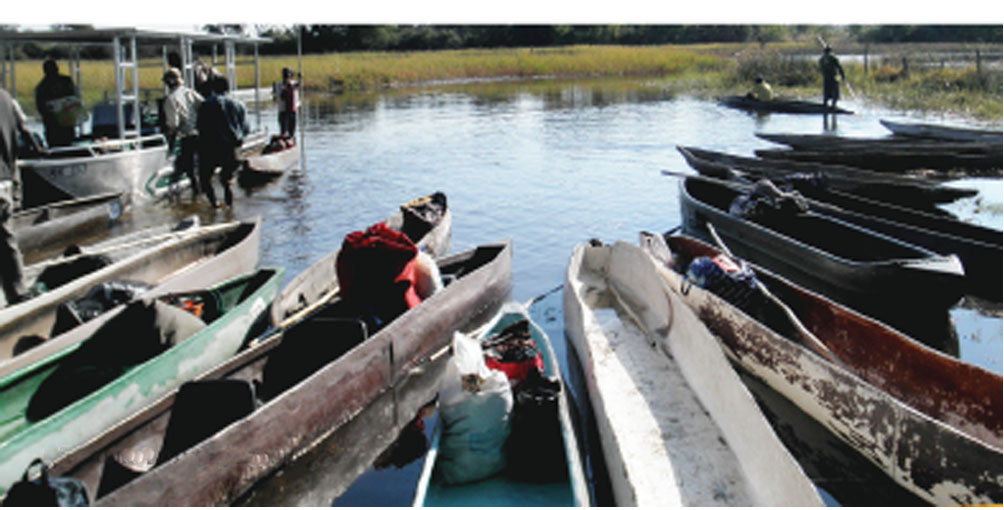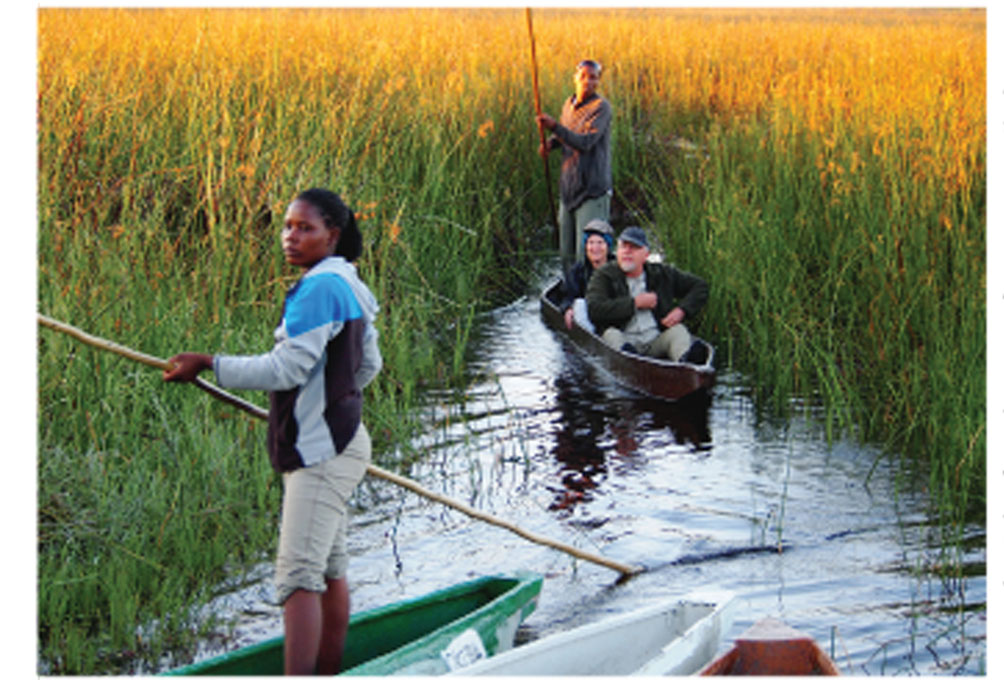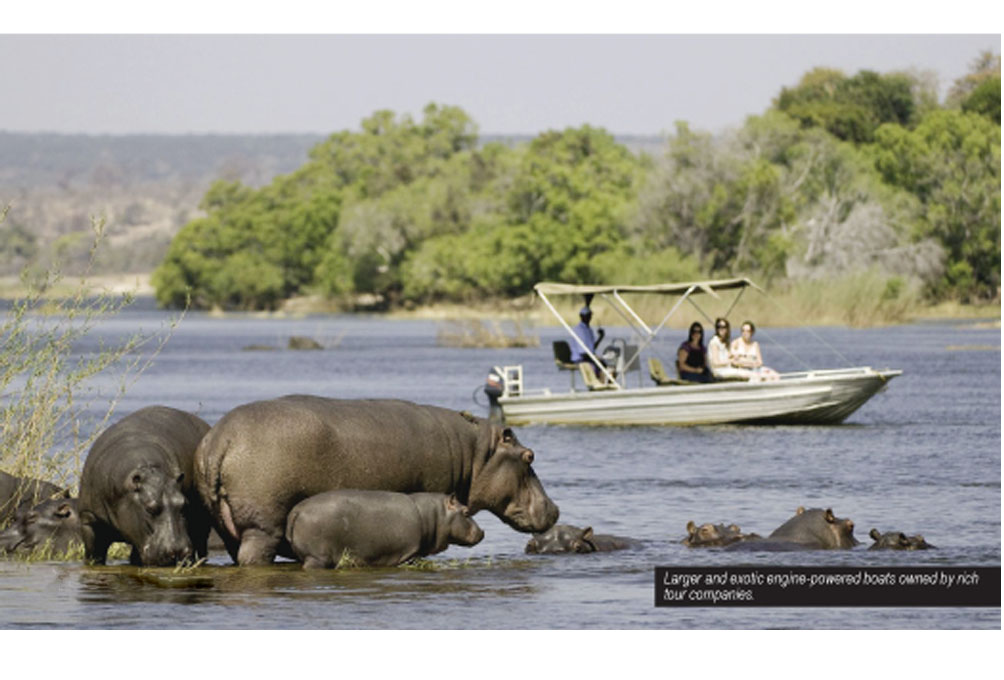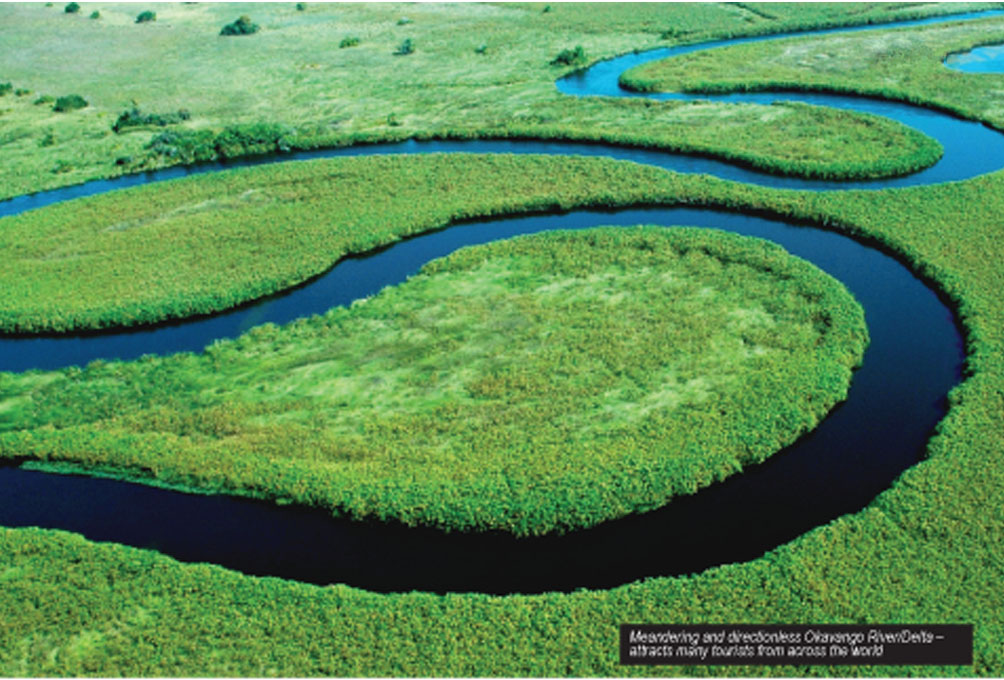Staying afloat with just a canoe
Source : Kutlwano
Author : Leatile Chamo
Location : Gaborone
Event : Social
Today, as Kemoneetse Xhaiywa drives into the village in a green safari pick-up truck, his face is that of one who is not happy.
Yet as he pulls the truck over at the boat station on the other side of the village, his face suddenly brightens up. It turns out this is one of the rare days on which Xhaiywa will be picking up quite a good number of tourists to his business. And when he explains to Kutlwano that he had expected fewer tourists, the mystery in his sudden change of mood is solved.
Little wonder then, that he is a troubled individual, for his business, as he recounts, has not been doing well lately. “Tourists have been coming in only in trickles,” he complains, adding, “this has not been good for business.” The lofty tour operator pins the problem on what he calls the mushrooming of well established expatriate tourism companies in the area. “And what a huge competition this is turning out to be,” he laments.
Xhaiywa’s claim simply corroborates a 1998 study by Ndubano cited in Mbaiwa (2002), which suggested that 81.5 per cent of tourist facilities in the Okavango Delta were foreign-owned. Considering the tour operator’s claims and the passage of time, this number has increased by now.
Apparently irked by this trend, the local people and critics have labelled the trend a feat of dominance which denies local people control over local resources. In fact, it is quite common, according to some reports, for the local people to frequently express the feeling that the delta has been taken away from them. Tourism, which is an aspect of globalisation, is viewed by many people in the Okavango Delta and elsewhere as problematic, and questions about its benefits and setbacks have been raised.
According to Xhaiywa, global tourism has ushered in the era of exotic, big, and fast engine powered boats, which tourists seem to prefer to the much slower, narrower, and unfashionable mokoro used mostly by local people.
However, Xhaiywa, a resident of Seronga village on the northern banks of the Okavango River where it begins to spread out into the famous Okavango Delta, says he and fellow residents are not watching helplessly as global tourism soars. “In our own small way we are fighting, and it is not as if we are getting nothing from our efforts,” he says with a comeback-like attitude. Through the Okavango Polers Trust (OPT), comprising a group of local polers, they have been able to take the battle to the doorsteps of expatriate companies. Their products and services, he says, include a traditional tourist resort called Mbiroba Camp, mokoro trips, and traditional dance and song.
Established in 1998, Mbiroba Camp is a low-market traditional lodge, which, together with its more than 100 employees, including 75 canoes, offers simple but good value cultural products and services to tourists and travellers at affordable prices. Most importantly, points out Xhaiywa who is the trust’s treasurer, the camp is used as a base from where tourists, who are not looking for luxury trips offered by the rich-operated tour companies, can embark on a mokoro voyage into the delta with an expert poler.
He says during such trips tourists can experience the pure landscapes, animals, and vegetation, as well as, in one British tourist’s own words, “total peace of the waters and familiar interruptions by the sound of a hippo, or the cry of the fish eagle, all of which offer the sound tracks of the delta. Another tourist from New Zealand remarks on the internet about her mokoro experience: “Silently floating through the lush vegetation with your body barely above water level, you are surrounded by the sounds, smells, and vivid images of the world’s largest inland delta. Using a pole to gently propel the mokoro forward, your guide brings it breathtakingly close to large hippos, or crocodiles.” In many people’s estimation, particularly international tourists, the traditional mokoro is the most authentic way to experience the Okavango Delta. And clearly the discernible demand for cultural tourism is undoubtedly behind the success of the Okavango Polers Trust.
Without taking anything away from global companies, Xhaiywa says global tourism lacks authenticity. “There is nothing authentic about the products and services they offer, everything about them is unnatural and showy,” he taunts. Speed boats may be faster and trendy, counters Xhaiywa, but mokoros have admirable advantages. Their slight width enables them to traverse shallow and narrow water ways and sections overgrown with aquatic vegetation. “This gives the traveler access to places unreachable by motor boats,” he argues.
The traditional mokoro is soundless, thus it can get tourists closer to animals without scarring them away as do motor boats, explains Xhaiywa. More importantly, the traditional canoe does not adversely affect the environment but motor boats affect water and vegetation through oil and petrol leaks. For this reason, he says motorboats have been banned in some parts of the delta because of their negative impact on the ecosystem. “And this is where we sneak in with our small and unsophisticated mokoro,” scores the obviously motivated tour service provider.
“He says this is how they have been able to stay afloat in the wide and deep ocean that is globalization. In a sense, they have cut themselves a niche in the cutthroat global tourism market - making the best use of the crumbs left by the big companies. Another way to fight competition, says Xhaiywa, has been to temper a little bit with the authenticity of the mokoro. “We now use a modernized wooden mokoro to comply with the expectations and demands of international tourists,” he says. Made of fiberglass, the new look mokoro is basically an imitation of the traditional wooden canoe; only it is better in terms of capacity, safety, durability, comfort, leak proof, and maintainability, explains Xhaiywa.
This is typical hybridization which is defined as when something is produced or derived from two different parts. For example, a mule is the hybrid of a male donkey and a female horse, according to the Oxford Advanced Learner’s Dictionary.
Therefore, in this case, it can be argued that the fibregass canoe is a hybrid of local and global cultures because it was derived from the old local mokoro concept on the one hand, and modern global materials on the other. Here the theory that argues that globalization is the meeting point of the old and the new ways of life suffices. However, authenticity aside, for Xhaiywa, one thing is certain about the new creation.
With qualities from two heterogeneous sources, fiberglass canoes are better than traditional mokoros, that is, according to feedback from both local and international tourists, he says. By sticking to cultural tourism the trust has not only promoted local cultures, but has turned out to be the group’s competitive advantage, “tourists like nature and strange things, and mokoros provide just that,” says the seemingly content cultural tour operator.
They did not stop there, says the tour operator. Another dimension regarding transformation has been in the training of tour guides to gain more global information and communication skills; to refine their guiding skills, water skills such as diving; to gain scientific knowledge of plants and animals so as to adopt a global perspective in their new role. Xhaiywa says polers from the Okavango Polers Trust have benefited greatly from government’s cultural tourism promotion programme by attending guiding courses in Maun. Therefore the new look canoe coupled with qualified polers and guides, certainly accords travellers safer and assured trips.
Jerry Humphrey, a British tourist, posted on the internet his delta experience after a fibreglass mokoro tour: “We saw a big group of elephants crossing the river less than 20 metres in front of us, this is one of those moments when you shut up without being told, you just do it and contemplate the scene amazed.” Xhaiywa says, on occasions when dangerous animals such as elephants, hippos and crocodiles are encountered, the poler’s indigenous knowledge is put to the test. “He must be able to predict the intentions of the animal and thus act aptly to safe the tourists on board,” he says. About one particular poler, Humphery says when a hippo appeared to have dived into the water towards them, the poler knew exactly what to do and how to do it; “he confidently stirred the canoe clear of the looming danger much to our relief, we were all nervous,” reads the tourist’s web posting.
Scholars who welcome globalization contend that societies must respond to it in a manner that is non-territorial in basis so they can take advantage of the now more than ever open world system. Certainly globalisation is not something one can simply wish away, rather it is a phenomenon that is here to stay, for better or worse, as such people have better take advantage of whatever positives it can offer.
The benefits are on top of the hill for everyone to see; for example, Xhaiywa says most of their guests are expatriates from as far as Spain, Britain, Belgium, and South Africa. The services and products sold to these people include mokoro trips, traditional accommodation, food, and entertainment such as traditional and cultural dance.
“All these are good money spinners for us and our families, and the community as a whole,” enthuses Xhaiywa, and for sure one can’t help but sense some strides in the direction of Vision 2016’s pillar of “a prosperous, productive and innovative nation, and what a good way to enjoy the fruits of independence”.
That said, the obvious gains derived from the growing tourism industry in the area, particularly in the stimulation of cultures such as the mokoro, the logical conclusion is that Xhaiywa and fellow residents will be driving down the boat station to pick up more and more tourists for many years to come. That is, of course, if they can continue to view globalization threat. ENDS
Teaser:
Although many people view globalisation as a threat to local cultures, curiously, some residents of Seronga village in the Okavango Delta are running a successful eco-cultural tourism project – combining the natural and cultural aspects of the delta to charm tourists - side by side with the rich global tourist companies. Kutlwano uncovers the secret behind this success.
















